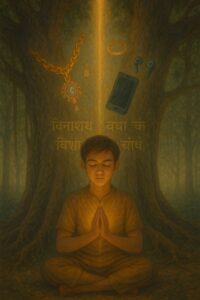The mirage of existence

Maya, literally translates to an illusion or magic. Maya, means the deceptive nature of the material world, obscuring our true nature and preventing us from recognizing the divine reality, ultimately leading to attachment and suffering. It refers to the physical realm that we are residing in. Maya is everything we can see, touch, hear, smell and feel physically. It is the force that prevents us from recognising true divinity. It works like VR (virtual reality), where we are the soul, the VR headset is our human body and the VR world is maya. The graphics in the VR world are incredibly interactive and addictive. They are so addicting, that it prevents the user from removing the headset. Maya is so captivating that we forget why we are really here…our true purpose in life. It drowns us in an ocean filled with happiness, sorrow, love, hate, success, failure, bonds, debts, relationships, etc. This has been mentioned in the Gita too.
“ध्यायतो विषयान्पुंस: सङ्गस्तेषूपजायते |
सङ्गात्सञ्जायते काम: कामात्क्रोधोऽभिजायते ||”
“dhyāyato viṣhayān puṁsaḥ saṅgas teṣhūpajāyate
saṅgāt sañjāyate kāmaḥ kāmāt krodho ’bhijāyate “
“While contemplating on the objects of the senses, one develops attachment to them. Attachment leads to desire, and from desire arises anger.” [ verse 2.62]
“क्रोधाद्भवति सम्मोह: सम्मोहात्स्मृतिविभ्रम: |
स्मृतिभ्रंशाद् बुद्धिनाशो बुद्धिनाशात्प्रणश्यति ||”
“krodhād bhavati sammohaḥ sammohāt smṛiti-vibhramaḥ
smṛiti-bhranśhād buddhi-nāśho buddhi-nāśhāt praṇaśhyati”
“Anger leads to clouding of judgment, which results in bewilderment of memory. When memory is bewildered, the intellect gets destroyed; and when the intellect is destroyed, one is ruined.” [verse 2.63]
These verses explain the process of the degeneration of intelligence. It begins with constantly thinking about and dwelling on the pleasures derived from our senses. This contemplation leads to attachment. We become fixated on these sensory experiences, desiring them more and more. From attachment arises desire/lust. This is a strong craving to possess and enjoy those sense objects. Finally, from desire, anger arises. When our desires are frustrated or obstructed, anger manifests. From anger comes delusion. Our judgment becomes clouded, and we lose our sense of reality. From delusion bewilderment of memory. We forget important values, lessons, and spiritual truths. From the loss of memory, the destruction of intelligence. Our ability to discriminate between right and wrong is diminished. From the destruction of intelligence, one perishes. Meaning, one is spiritually ruined. It is a chain reaction that eventually leads to destruction of intelligence, that eventually makes us forget about the divine truth.
Contemplation of sense objects → Attachment → Desire → Anger → Delusion → Loss of memory → Loss of intelligence → Spiritual downfall.
For example, when’s the last time you sat alone in a quiet place and spoke to God? When’s the last time you thanked him for everything he’s given you? Take a couple of seconds to think about this.
You’re probably thinking of reasons about why you didn’t do all this. You probably even found a few. “I had exams.” “I had a hectic month at work.” “I have kids to take care of, I don’t have time for this.”- these are probably some of the reasons that came to your mind … .and that is maya. All the distractions, all the responsibilities, all the duties, all the work and EVERY SINGLE ATOM in this material world is maya. It is something that makes you focus on itself instead of the divine truth. You got all these reasons because they are true. It’s not your fault that you didn’t dedicate your time to God. It is merely the effect of maya. It creates an illusion that the material world (basically maya itself) is more important to you than the divine truth, so that you focus on it and dedicate all your time to it. The solution to it is quite simple…just in words.
“एषा ब्राह्मी स्थिति: पार्थ नैनां प्राप्य विमुह्यति |
स्थित्वास्यामन्तकालेऽपि ब्रह्मनिर्वाणमृच्छति ||”
“eṣhā brāhmī sthitiḥ pārtha naināṁ prāpya vimuhyati
sthitvāsyām anta-kāle ’pi brahma-nirvāṇam ṛichchhati”
“O Parth, such is the state of an enlightened soul that having attained it, one is never again deluded. Being established in this consciousness even at the hour of death, one is liberated from the cycle of life and death and reaches the Supreme Abode of God.” [verse 2.72]
The summary of all this is: we are drowned in a world full of opposites- pleasure and pain, joy and sorrow, profit and loss, victory and defeat, success and failure, birth and death. We work and strive to achieve one side of each pair of opposites- pleasure, joy, profit, victory, success. But the truth is, both sides don’t matter. You need to withdraw all your senses and live, treating everything equally. You should be free from all desires and have one single desire- salvation (moksha), to be liberated from life and death and become a part of God.

It’s not your fault that you haven’t thanked God for everything he’s given you or that you haven’t spoken to him in a long time. However, it will definitely be your fault if you continue to not do it. A wise person once said, “if you dedicate 5% of the interest and time you give to humans and maya, to god, he’ll appear right in front of you with abundant love and care.” All it takes is a moment to thank God for everything he’s given you. In Hinduism, it is believed that a soul traverses through 8.4 million different forms of life (84 lakh) before attaining a human form. Within these belief systems, a human birth is considered a rare and valuable opportunity for spiritual growth and the pursuit of enlightenment or liberation (moksha). So, we’re pretty darn lucky to be born as humans, and we owe it to God. He is the one who has given this life to us. The sad part is, we don’t even take a moment to thank him. A method to thank him is “nama japa”. It is a spiritual practice involving the repetitive chanting or silent recitation of a divine name or mantra, often used for meditation and spiritual growth. I plead with every single reader to thank our creator, God, for everything he’s given us. Take a moment to thank him, EVERY DAY.





